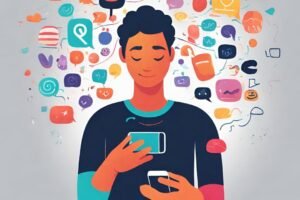In the vast expanse of the digital era, social media has become an inextricable part of our daily lives. It’s the first thing many of us check in the morning and the last thing we browse through at night. But have you ever stopped to wonder why? What is it about social media that has us hooked? This blog delves deep into the psychology behind our social media obsession, exploring the intricate interplay of human behavior and digital interaction.
The Dawn of the Digital Age
Social media’s rise aligns with the rapid growth of the internet and smartphones. Platforms like Facebook, Twitter, Instagram, and later, TikTok, have transformed how we communicate, share, and perceive the world. But beyond convenience and connectivity, these platforms have tapped into deeper psychological needs and behaviors.
The Science of Social Media Engagement
- Dopamine-Driven Feedback Loops: Every like, comment, or share triggers a release of dopamine, a neurotransmitter associated with pleasure. This process creates a feedback loop. The brain remembers this pleasure and wants more, driving us to keep posting and checking for notifications.
- The Fear of Missing Out (FOMO): Social media has exacerbated the feeling of FOMO. Seeing posts about events or social gatherings we’re not part of can evoke feelings of anxiety and exclusion, compelling us to stay continually connected.
- The Social Comparison Theory: Social media platforms are ripe for comparison. We often compare our lives with the meticulously curated images and narratives presented by others. This comparison can affect self-esteem and mood, yet the compulsion to compare keeps us engaged.
- The Need for Social Connection: Humans are inherently social beings. Social media platforms cater to this need by offering a sense of belonging and connection, albeit digitally.
The Role of Algorithms
Social media platforms use sophisticated algorithms to personalize user experience. These algorithms curate content based on your interactions, ensuring that your feed keeps you engaged longer. They create an echo chamber, reinforcing your beliefs and interests, which, while comforting, can also narrow your worldview.
The Impact of Influencers
Influencers play a significant role in our social media engagement. We tend to trust individuals more than corporations, and influencers leverage this trust. They create relatable content, making it easier for us to connect with them and, by extension, the products or lifestyles they promote.
The Darker Side of Social Media
- Cyberbullying and Trolling: The anonymity and distance provided by social media can lead to a rise in cyberbullying and trolling. These negative interactions can have severe impacts on mental health.
- Addiction and Mental Health Issues: Excessive use of social media has been linked to addiction, depression, anxiety, and reduced attention spans. The constant need for validation and comparison can erode self-esteem and well-being.
- Privacy Concerns: In the pursuit of personalization, privacy often takes a back seat. Users unknowingly share vast amounts of personal data, sometimes with unintended consequences.
The Positive Aspects
However, it’s not all doom and gloom. Social media also has positive impacts:
- Global Connectivity: It has connected the world like never before, allowing for cultural exchange and global awareness.
- Platform for Change: Social media has given a voice to the voiceless, becoming a powerful tool for social change and activism.
- Educational Resource: It has become a valuable educational resource, with platforms hosting a wealth of knowledge across various fields.
Finding Balance
To harness the benefits of social media while mitigating the negatives, we need balance. This can be achieved through:
- Conscious Usage: Being mindful of our social media consumption, setting limits, and taking regular breaks.
- Critical Engagement: Engaging critically with content, understanding that social media often presents a skewed version of reality.
- Protecting Privacy: Being more vigilant about the information we share and understanding privacy settings on various platforms.
Conclusion
Social media, a modern marvel, is a double-edged sword. It has the power to connect, educate, and inspire, but also to isolate, mislead, and overwhelm. Understanding the psychological hooks of social media can help us navigate this digital landscape more wisely, ensuring we control our social media use, not the other way around. In the end, like any tool, the impact of social media lies in how we choose to use it.




